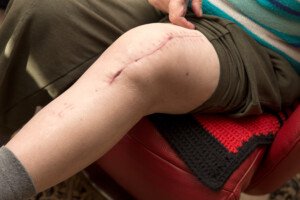
“Total Knee replacements can ‘fail’ by a number of mechanisms,” says orthopedic surgeon David Fisher, MD, Director of the Total Joint Center at the Indiana Orthopedic Hospital.
There are five chief reasons for a failed TKR. Unfortunately, the first one that Dr. Fisher mentions brings to mind the concept of surgeon error.
He states, “In some cases, they were not implanted in a way that creates a well-functioning knee, and the patients are never happy with them. This is one of the more common causes of revision knee replacement.”
It’s deeply troubling that surgeon error cannot be proven, as the defense will blame the manufacturer of the hardware and/or loosening of the cement over time.
Dr. Fisher continues, “Another common reason is an infection develops postoperatively and leads to a need for revision.
“This may occur in 0.1-2% of knees and may be related to the volume of the operating surgeon and the hospital in which the surgery was performed.”
Following knee (and other joint) replacement or revision surgery, patients will get their temperature taken as often as once every four hours, and this includes overnight, to check for signs of an infection.
“Late infections can develop occasionally many years after implantation,” says Dr. Fisher.
The first signs of an infection may be warmth and redness about the knee.
“Loosening of the prosthesis rarely occurs in the first few years but can be a cause of late failure and will usually be associated with pain and swelling.”
The final mechanism behind a failed TKR: “Polyethylene (bearing surface) wear can also occur many years after implantation and cause symptoms of pain and swelling.”
What if your knee replacement (or hip) has been doing great since surgery?
Dr. Fisher says, “In general, it is recommended that someone with an artificial hip or knee have a regular checkup and X-ray of the affected joint to pick up on any changes that might be occurring.
“That interval could be every 2-5 years if the joint is working well.”
 Dr. Fisher has been involved in research and development of total hip and knee implants and has had numerous articles published in professional journals, and has participated in many research projects.
Dr. Fisher has been involved in research and development of total hip and knee implants and has had numerous articles published in professional journals, and has participated in many research projects.
 Lorra Garrick has been covering medical, fitness and cybersecurity topics for many years, having written thousands of articles for print magazines and websites, including as a ghostwriter. She’s also a former ACE-certified personal trainer.
Lorra Garrick has been covering medical, fitness and cybersecurity topics for many years, having written thousands of articles for print magazines and websites, including as a ghostwriter. She’s also a former ACE-certified personal trainer.
.








































